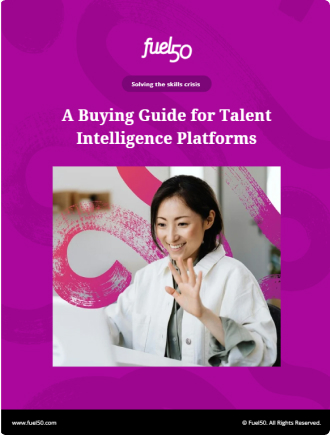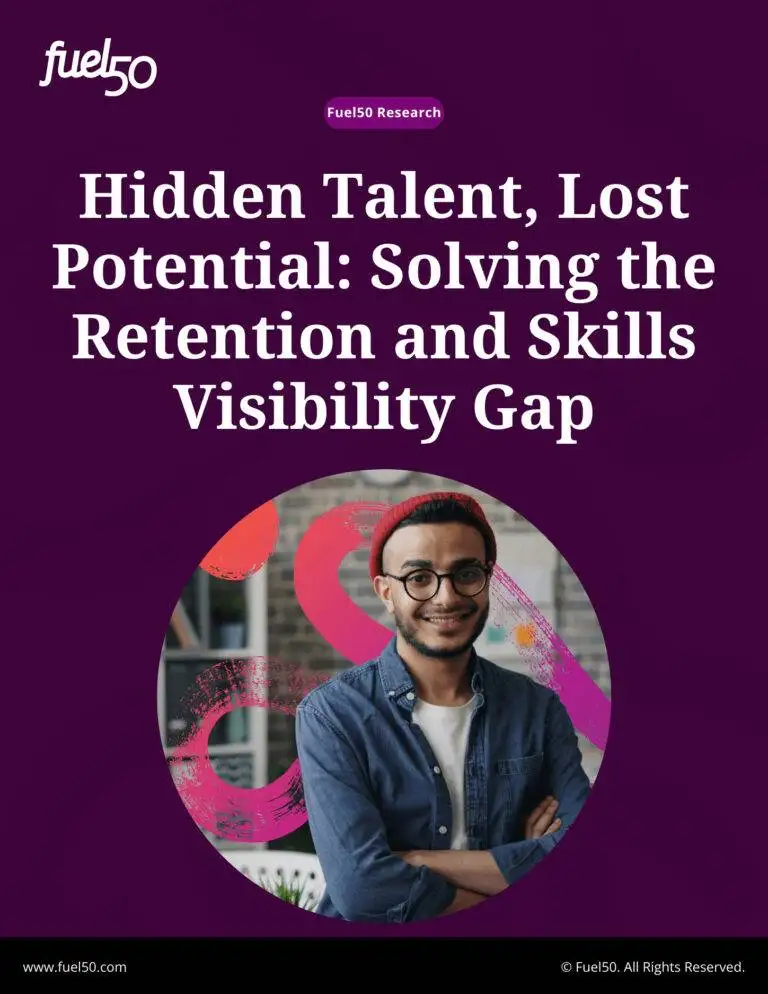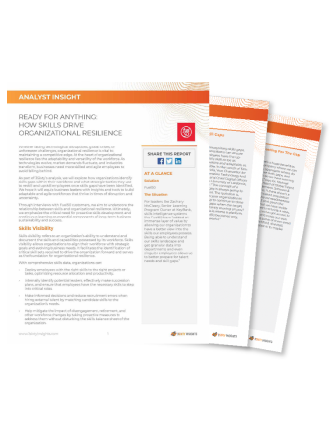This week’s episode of the Talent Experience Podcast explores the world of coaching and how it can support individuals and organizations to reach their goals and improve their performance. Listen to Hannah Nash, Career and Transition Coach for 10Eighty, and host Rhonda Taylor as they discuss the ROI of coaching, supporting employee engagement, and the overall value of coaching and mentoring. Tune in below, at tlntx.co/hannah, or wherever you like to podcast!
Here’s how the conversation went… This interview has been edited and condensed.
Rhonda Taylor: Hello, my name is Rhonda Taylor, I’m the host of the Talent Experience. Today on the Talent Experience, we have a good friend of mine, a partner of mine at work, and someone with an incredible depth of knowledge in the coaching space. And today, I would like to welcome Hannah Nash from 10Eighty. Hannah, can you introduce yourself for us?
Hannah Nash: Of course, thank you Rhonda, it’s very kind of you. We’ve work together for a long time now, esteemed colleague. So, I am Hannah Nash, and I’m a Career Coach for 10Eighty. And I would consider myself now a career management expert. And I’ve been coaching in space now for about 12 years. And I started out my early career working with vulnerable adults to secure employment. So, it’s always been my passion that everyone should have a job, then enjoy, and career success, I think, you know, there’s nothing worse than dreading a Monday. And I think we should all get up and really be ready for our week and really enjoy what we do, regardless of what that is just as long as you’re happy and enjoying it. And my experience has led me to really enjoy and want to work with people around coaching and career management. And over the last 12 years, I’ve worked to support people, whether it be that they’re exiting businesses, leaving their job into new roles, or whether it be that actually, they’re looking for a complete first change. And one day woke up and thought I no longer want to do this job; I want to do something completely different. And what I love about the coaching space is you start working with someone, and you get to really know them and understand what their passions are to then be able to propel them into what it is they want to achieve, and then see that happiness that they get on the other side of it. So that’s my background, so career coach for the last 12 years. And it’s a real passion of mine.
Rhonda Taylor: Yeah, and you’re the perfect candidate for us to have this discussion. I right now, everybody’s talking about upskilling, and talent mobility. And I wanted to speak to you about the role of coaching in upskilling. And I guess, let’s just start at the very basic beginnings, you know, they’ll raised me, you know, what is coaching and why is it a good initiative?
Hannah Nash: Really good question. And especially with this idea of reskilling, movings, career mobility. The essence of coaching is this understanding the skills you have, and the drive and values you have, and then aligning those with the job you’re doing. So, it’s that, that piece around working with a coach who understands you, and what drives you, to then propel you to be able to do different roles, and really harness those skills, and actually nail down into that and say, these are the skills I have, and I’m using, and these are the skills I really want to learn and develop. And I think what the coaching, is, is this almost like a sounding board that an independent can offer you, we really are that person that you come to and say these are the things I think I’m good at. And the coach can say, absolutely, let’s talk through why how that is. And actually, how we’re going to nail down into that role. And, and one of the things I would say, coaching over the years is it’s really important this knowing how and knowing why we do what we do, you know, how, what skills that you’ve got? What is it that drives you? What gets you out of bed in the morning? And the knowing why, you know if that will nail down into yourself, and that is what propels us, really, to be able to do what we do. And I do think that coaching gives people that objectivity to understand that and have that sounding board. So that’s what coaching is, but it really is that, you know, understanding yourself and having that person to coach you through that. And in terms of, you know, why we do it. It’s that piece around, it’s really important as to where I am right now, and this is where I’m going to get to and using that person to help you understand your skills and push you that. Does that answer your question, Rhonda?
Rhonda Taylor: Yeah, you sure did. Hannah, it made me think of something else. In today’s world, like, you know, I grew up in the world of LMS and oh my god sit down and reading papers with screens and screens and screens of information. By now there’s learning by doing gigs there’s learning by doing mentoring. There’s learning by having a coach. Can you share with me the three types of different learning that goes on, and what’s the difference in the learning process between mentoring, coaching, and gigs?
Hannah Nash: Okay, it’s a really good question. I’m not always sure they are completely different. What I would say is, so if you are sitting down to learn and understand and develop a skill using an LMS, for example, or a workshop, or a webinar, it’s very much that talent sell. So, you’re sat down, you’re using the resource, you’re really nailing down into that, and it’s giving you certain skills. So, what I would say is, it’s very much practical, you learn that you take it away. But actually, the idea is, then you’ve got to go and use it to embed it, because actually, it’s a scene learning, I would call it. The next element around the gigs. Now, this is a really interesting learning. So, this is about learning on the job as you go. So, this is upskilling, you know, fundamentally, you put yourself forward for a project or a gig, and actually, what you’re doing is why you are doing that you are acquiring new skills that you’re then seeing yourself develop, that will help you to progress yourself and your career going forward. But they’re not things that people are telling you, you’re literally learning as you go. So it may be that you’re involved in a completely new exercise that allows you to develop that skill, and then assign an element around mentoring. I think there’s two stages to this actually Rhonda, I think there’s a bit around working with someone with experience to help you learn from what they’ve experienced, that you’re learning from them to develop skills, and taking ideas of how you might go back to your current role, and develop those skills and get involved in different practices to do that. But the other thing is, I think it’s about developing your network. So, I think having a mentor and a coach gives you exposure to other people in other areas, because it develops on our network. So, you’re not just developing your skill, you’re also getting transparency of other people who were in those industries, or those sectors, or those wells that actually can then understand what you’re trying to achieve. And what we know is that when our network knows what we’re trying to achieve there quite often will put us forward or make suggestions for us and introduce us to their network. So, I think the learning there is you’re learning from other people’s experience, but you’re also learning how to widen your network, so they can help you be more successful. So, I think those three different types of approach to learning, incorporated with coaching can really help you. And I think, quite often a coach will help you identify the kind of learning you need and also to take that development.
Rhonda Taylor: Right. You know, that was a great explanation, because we’re asked that all the time, you know, what, what are the benefits of it? And I guess Hannah, you are really well respected in the coaching space, I know you’ve working with United Nations. So, I’m gonna ask, you know, when is the right time for a company to reach out and bring in a coaching program?
Hannah Nash: Oh, that’s a really good one. So there’s various different times, and I would say that my experience is, the first piece is around those first 90 days, you’re new to post, you’re in that post, and you know, the first 90 days of, of getting in there, it’s 30 days of, you know, observing and seeing how the culture is really understanding what goes on in visits, the next 30 days is identifying where you can make the difference, and how you fit in and learning the skills to do that. And the last 30 days is around setting those objectives for your long-term career goals. So, I think there’s a piece around coaching in your early career. So, when you’re first in position, and really learning to have someone to help you through that journey. I think there’s real value in having coaching with someone who is maybe new to being a manager or new to an area of the business because I think there’s a piece around that you can actually have a sounding board for all the things you want to do, and understanding other people’s objectives and how you develop your role at the same time of developing others. And I think a coach can really give you that objectivity that you need to help you do that. So, I think this will have value in having coaching there. So, if I’m truthful and I mean I am a bit biased, but I do think that even if whether it be a mentor or coach or a friend, you should have a touch point for your own career. Now, I’m going to liken your career management to going on holiday you would never wake up in the morning, run out the door, chuck all the clothes and stick them in a suitcase, and then go to the airport and jump on a plane and then get on with it, and think, oh God, it’s a bit cold, it’s wet, I’ve got no money. Because actually, we often spend months planning a holiday that it’s only two weeks. So, why wouldn’t you do that for your career. So, I’m an advocate that you should have coaching at different stages in your career, because actually, it’s all about having a plan, because ultimately, that was been 45 years in the job and get the end of it and think that wasn’t where I wanted to be. So, I think there’s real value at different stages in your career, to get a goat or get a mentor to really help you progress and see that you’re achieving what you set out to achieve and you’ve got objectives for that. And for the business, coaching is very beneficial. What we know about coaching is, if you harness your capabilities, your ROI will increase. And, you know, there’s a real need for that in people, if we can invest in them now, actually the return on investment is massive for a company.
Rhonda Taylor: Have you witnessed any statistics at all on, you know, you have a group in and you’re coaching with them, what is the fall off rate? That would be interesting, because I know that in the past systems, there was always a significant fall off rate, have you witnessed any type of data around that?
Hannah Nash: No, I would say drop off rates, or a coaching program will be no less than 9 to 10%. And the reason I say that is because if you are working with someone who is working to help you, you stay invested. So, coaching along with technology can be really beneficial. Because what you’re doing is using the technology to identify things you know about yourself, and what’s important, and what drives you, and using the coach to embed that and keep bringing back to that support. And what we do know is, you know, coaching programs, it’s very rare that you lose, you get disengagement, unless people leave businesses, you know, and it could be, I’m not gonna lie, that you might start a coaching program and realize that job’s not for you. But that’s a rarity. And I think, actually, if you do have those people, you probably do want them to move on anyway, because they’re not invested in your business. But we know, uptake for coaching, that coach is there to support you, to talk about you, and to help you develop yourself, we know that there will be the would good engagement level. And in terms of from the business perspective, you know, all the research shows us that if you increase engagement by just 5%, you know, average share value increases tenfold. So, we know that if you invest in your people, and you care, develop, and stretch them, you will get that return on investment back.
Rhonda Taylor: Hannah, it starts at the individual, usually knowing that they want more, to learn more in their possession. Then it goes to the HR because the individual talks to HR and HR understands, hey yeah, we should be looking, how does HR go to the C suite, part of the company and sell coaching?
Hannah Nash: Oh, that’s a good one, and I think it is something we are still struggling with as the HR community. I think it’s tough, because, you know, I’m basically saying to you, I need X amount of budgets, or this one individual, and I won’t be able to show you the return on investment, he’ll post coaching program, which could be anything from, you know, three weeks to nine months, depending on the kind of program it is and what you’re purchasing in place. So, what I think we need to do more of, and what we definitely do as an organization is look at metrics. So, we’ll look at things like you know, we’ll be looking at recruitment, retainment, you know, all these things that we can then measure on from the business point of view, in order to ensure that it is a good investment. So, we will look at levels of engagement, we will look at engagement surveys, you know, we will look at these things and then pull it in to have a look at the coaching programs to see how that aligns. But it is making a case, I think you have to go to the business and say if we invest X and this individual, we know will push out their lead date 18 months. So even if you looked at that and the cost of recruitment and level two together because you know, the average cost of recruitment is double the salary. If you’re not going to push out their time with you, therefore, you actually know that you want to keep that. And, and so that’s about putting the business case together. But I have to admit Rhonda, it’s a difficult one.
Rhonda Taylor: It must be, and I take a look at, and the reason I asked that, I take a look at, there’s platforms out there that service the whole company, that it’s a matter of them clicking and saying, I want to coach and the coach coming forward and being set up with the individual. Whereas opposed to there being a strategic one where the person knows that they need a coach, and they go to HR, as opposed to the coaching program coming to them. Do you think that there’s a different type of reception by the employee with the two different programs?
Hannah Nash: I do, but I think it’s difficult because I think some people, you’ll need that one off coaching program, that will be substantially expensive. Another way to look at it is if you are upskilling, people, giving them coaching, and then you start to change the culture, and that transitions down and you start to build internal coaching capability, I think in terms of making the case for the business is probably much more beneficial. So, if I’m giving a certain level of individual coaching, and then that culture then starts to trickle down, I think you could definitely start seeing the business case and the value within the business. But you know it’s a tough one.
Rhonda Taylor: It is a tough one. And it’s relatively, you know, it’s just a question that arose in the HR space in the past couple of years.
Hannah Nash: And what I would say is that I think you can have the tech and you know, the tech is brilliant, and you know, if you cut costs per person fab, but you’ve got to sometimes change the culture in order to make sure that return for the technology is there.
Rhonda Taylor: Exactly. How can coaching support a company overall, a coaching program?
Hannah Nash: So, really good question, so I think it will increase engagement, which will actually make the business more profitable. So, I’m going to say that that is my (inaudible). If you give individuals across your business, the opportunity to have a coach to really show that you care, and you want to develop them, then you will see engagement rise, and you will see profitability rise. And I think there’s a real case for giving that to individuals. And even if it’s just very small, maybe it’s one session. But if you do that, and you get your managers to spend that time having those conversations, you will change the culture and you will become more profitable. So that’s where I think the case lies Rhonda, is you do it, it’s the right thing to do. And people will stay, and the business will be more successful.
Rhonda Taylor: I have a little equation that I think high engagement equals high retention.
Hannah Nash: Absolutely, yeah. I mean, who’s going to leave an organization where I’m being invested it and people care about me? Because I know I’m not going to.
Rhonda Taylor: What is your definition of a company having a sophisticated coaching program?
Hannah Nash: We’ve worked with lots of different organizations, I think that’s a tricky one. Because I think you can have different varies. You can have career coaching and career transition; you can have executive coaching. But I think the companies that have really successfully made it work because they’ve given lots of different levels and lots of different coaches to individuals. And actually, it could be something as simple as you train a series of mentors, and then you have an own internal mentoring program that is harnessing your coaching and underpinning so you know, you are training people year on year, giving them mentors, getting them to upskill as coaches, and then that feeds through your business. But in terms of where I’ve seen it been really successful is lots of businesses, professional services often give people new leaders, coaches, and then then you can see those people grow and become almost coaches themselves.
Rhonda Taylor: Yes, I personally have seen that. I have personally seen that. Hannah, you’re just such a wealth of information on coaching, and I thank you so much for being a guest on the Talent Experience. We could talk about coaching all day, and unfortunately, we don’t have the time, so Hannah, thank you!
Hannah Nash: Thank you, Rhonda. And I’d encourage you all to have a plan and enjoy what you do. Be passionate about what you do. Thanks guys!
Rhonda Taylor: Thanks again, Hannah. And this is Rhonda Taylor from the Talent Experience saying have a great day!














